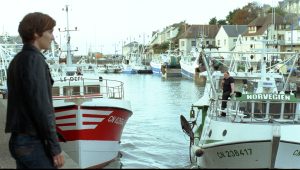A little mention of my new show in this article in The Weekend Australian:
(Though I’m not sure how “young” I qualify as these days!)
Short film
Director: Danielle Boesenberg
Writer: Rachael Turk
Producers: Sam Meikle, Rachael Turk
Executive Producer: Sam Worthington
DOP: Michael Steel
Actors: Claudia Karvan, Damian de Montemas, James Carter
As life threatening allergies throw his family into crisis, 13-year-old Henry must make a heart-wrenching decision.
“James Carter gives an empathetic performance as a 13-year-old boy whose two-year-old half-brother is dangerously allergic to his cat in this keenly observed domestic dynamic.”
– The Age
FESTIVALS:
• 2013 St Kilda Film Festival (Opening Night)
• 2013 Festival du Cinéma des Antipodes, St Tropez (France)
• 2013 Heart of Gold Film Festival
• 2013 Best Shorts Film Festival (US)
• 2014 Flickerfest
• 2014 Green Bay Film Festival (US)
• 2014 WOW Film Festival (Opening Night)
• 2014 Byron Bay Film Festival
• 2014 Cinema des Antipodes section of Cannes Cinephiles (Cannes Film Festival)!
AWARDS:
• Award of Merit, Best Shorts Film Festival (California, US)
See the film here.
Password: howiemeowie
A Quick Guide to Crowdfunding
The inaugural Creative Mornings Sydney kicked off this morning with a talk by Pozible co-founder Alan Crabbe on the reality of crowdfunding and the benefits of his particular platform, the largest in Australia.
Crowdfunding was loosely quoted as meaning “to get heaps of people to chip in to do something epic”!
In a nutshell, the benefits of crowdfunding (apart from the much-needed cash) include:
• an engaged audience
• proof of concept
• social media integration (Vimeo, bookmarking and blogging functions)
• leverage (for brands and further investment)
See Kevin Kelly’s concept of the ‘1000 True Fans’ (“a circle of diehard fans which can provide you with a living”) and how they are so crucial in the ongoing success of your efforts. And so need to be supported as such.
Tips for the kinds of things that work on Pozible are:
• having an existing fanbase (Facebook, Twitter)
• word of mouth
• local organisations and communities
• influential people and recognition (make those who have helped you known on your project)
• visual appeal
• the personal and real
• unique offerings in return
• video
Stuart Bowen, behind the short, stop motion animation project Woody, raised over $12K (from an $11K goal) in first batch on Pozible and almost $6K (from a $5,500 goal) in a followup call for finishing funds. His video is testament to how a well-produced video can work well within a great pitch. At the same time, he went for (and got) Emerging Filmmaker funding from Screen NSW.
His advice is to budget properly first and ask for it all in one hit, with even a little slush factored in.
Given his aim is for a large festival release for Woody after completion, he offers a “Supporter and Crew Screening” online with an HD download after the festival shelf-life.
Whilst the size of Pozible’s project base is smaller than Kickstarter’s – currently numbering 230 projects versus 2,500 – and even IndieGogo, the benefits of Pozible were described as:
• hands-on support and advice
• smaller cut taken by the platform (5-7.5%)
• contributions made in AUD
• building awareness amongst your Australian home base, much like the release of a film on home soil first.
Stay tuned for Scratch, our own Pozible pitch in coming days!
Photos by Liz Laughton @pixelchickenAus
Twin Sin Cities
Music clip for Berlin artist Schmidt
Directed by Rachael Turk
Writers: Rachael Turk, Ruby Boukabou
Producers: Rachael Turk, Ruby Boukabou
Music © Warners
[created for Interfilm and Genero.tv]
What happens when you dive into the sea at Bondi Beach and wake up in a bathtub in Paris? An international striptease of sorts, this clip reflects a generation for whom nationality is fluid.
See the clip here.
AFTRS Arts journal Lumina has shone at the global 2011 Independent Publisher Book Awards in New York.
Lumina tied for silver in the Best Non-Fiction category for Australia & New Zealand.
Lumina is published by the Australian Journal of Screen Arts and Business, and was edited by David Court, Sandra Levy, Karen Pearlman and yours truly.
The current issue focusing on ‘Screenwriting’ can be purchased from AFTRS online here.

Writer/Director: Alix Delaporte
Producer: Hélène Cases
[In Australian cinemas May 19 through Palace Films]

This is the type of film that once would have been described as the perfect first feature film: largely a two-hander, it is a modest story set largely in domestic locations with natural lighting. And is it – the debut feature from a French director who has established her screen career in television and short films. However, in the current Australian funding climate, with genre imperatives and commercial pressures at heart, it’s the type of first film that might struggle to be made. In a market flooded with superheroes, ghosts and werewolves, it is refreshingly low-concept: a simple, modern, naturalistic romance.
The film centres on two people desperately in search of intimacy: one who seeks it through indiscriminate sex, the other who resists the vulnerability innate to physical contact. It opens with a random sexual encounter and spends the next 85 minutes on a carefully helmed voyage to real intimacy. In an idea not entirely new but certainly revitalized in the astute performance of Clotilde Hesme, Angèle must find rebuild her self-love before she can have the chance of a relationship from Tony (Grégory Gadebois), himself grappling with a deep and recent loss.
A fisherman, a boat full of paper flowers and the solitude of the sea, there’s a lovely poetic at work at the core of the film. However, ironically, the strongest part of Delaporte’s direction is her restraint against sentimentality. The most intimate scenes are played with a matter-of-fact candour, the emotional turning points rendered so subtle they are almost overlooked.
Hovering somewhere between Shone Auerbach’s Dear Frankie (2004) – also set amongst the fishing docks and Beck Cole’s upcoming Here I Am (2011) (funded through the Adelaide Film Festival), Angèle et Tony is an unassuming tale of two adults trying to find their way to each other in the wake of heartache.
Friday On My Mind now has its very own edition of Lumina.
Brought to you by the Australian Film Television and Radio School, this issue contains interviews from the past year including:
• screenwriters such as Justin Monjo, Jacquelin Perske, Andrew Knight and Alice Bell
• writer turned director Stuart Beattie (Tomorrow When the War Began)
• producers Sue Taylor (The Tree) and Emile Sherman (The King’s Speech)
• teams such as Claire McCarthy and Jamie Hilton (The Waiting City)
• writer/director/actor Brendan Cowell and online wunderkind Nicholas Carlton
Interviews and edit by yours truly over the course of many a Friday eve. That’s many a bier forgone at the Bavarian.
So get your holiday reading now here online.
The Reef
Andrew Traucki & Michael Robertson
In 2007, producer Michael Robertson and director Andrew Traucki brought us horror/thriller croc feature Black Water and with it a model for low-budget, genre Australian movies. With shark film The Reef they take this one step further with a clever online strategy from the set and before to reel in audiences before cameras even rolled. Here they guide us through the new waters of online marketing.
Special guests:
• Michael Robertson – producer Prodigy Movies
• Andrew Traucki – writer/director (The Reef, Black Water, Rocky Star – TV)
Time: 5-6pm
Date: Friday, October 22
Event: Friday On My Mind
Venue: AFTRS Theatre, Fox Entertainment Quarter
An inspiring AFTRS event bringing you face to face with the industry’s brightest thinkers.
Free entry. All welcome. Join me for my last session of 2010!
Jucy details
Louise Alston on the budding “womance”
Fresh back from a full-house premiere at Toronto International Film Festival where Jucy* was listed in the ‘Top 15 Films to Watch’, director Louise Alston (All My Friends Are Leaving Brisbane) talks about the rise of the “womance” buddy genre and what it takes to get a second feature up in the current international climate.
Special guest:
• Louise Alston – director (All My Friends Are Leaving Brisbane, Jucy)
* free advance screening of Jucy!
Time: 5-6pm
Date: Friday, October 15
Event: Friday On My Mind
Venue: AFTRS Theatre, Fox Entertainment Quarter

An inspiring AFTRS event bringing you face to face with the industry’s brightest thinkers.
Free entry. All welcome.